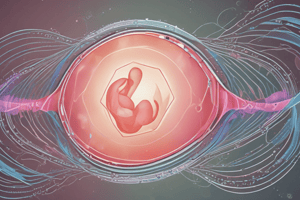Podcast
Questions and Answers
What is the primary cause of Down syndrome?
What is the primary cause of Down syndrome?
- A viral infection during pregnancy
- A defect in the mother's reproductive system
- The presence of an extra copy of chromosome 21 (correct)
- A genetic mutation inherited from either parent
Which of the following therapies is used to improve communication skills in individuals with Down syndrome?
Which of the following therapies is used to improve communication skills in individuals with Down syndrome?
- Physical therapy
- Speech therapy (correct)
- Occupational therapy
- Medication therapy
What is the purpose of chorionic villus sampling (CVS) in relation to Down syndrome?
What is the purpose of chorionic villus sampling (CVS) in relation to Down syndrome?
- To detect the risk of Down syndrome
- To treat the symptoms of Down syndrome
- To confirm the diagnosis of Down syndrome after birth
- To detect Down syndrome in a fetus during pregnancy (correct)
What is a common physical characteristic of individuals with Down syndrome?
What is a common physical characteristic of individuals with Down syndrome?
What is a potential health problem associated with Down syndrome?
What is a potential health problem associated with Down syndrome?
Flashcards are hidden until you start studying
Study Notes
Causes
- Down syndrome is a genetic disorder caused by the presence of an extra copy of chromosome 21
- This extra genetic material alters the development and function of the body
- The extra chromosome 21 can come from either parent, but 90% of the time it comes from the mother
- The likelihood of having a child with Down syndrome increases with the mother's age, particularly after age 35
Treatment
- There is no cure for Down syndrome, but various treatments can help manage its symptoms and associated health problems
- Speech therapy to improve communication skills
- Physical therapy to improve motor skills and coordination
- Occupational therapy to develop daily living skills
- Medications to manage health problems such as heart conditions, seizures, and sleep apnea
- Surgery may be necessary to correct heart defects or other physical abnormalities
Genetic Testing
- Prenatal testing: chorionic villus sampling (CVS) and amniocentesis can detect Down syndrome in a fetus during pregnancy
- Screening tests: non-invasive prenatal testing (NIPT) and quad screen can detect the risk of Down syndrome
- Postnatal diagnosis: physical examination and chromosomal analysis can confirm the diagnosis after birth
Symptoms
- Physical characteristics:
- Flattened facial features
- Small head and ears
- Upward-slanting eyes
- Small hands and feet
- Short neck
- Developmental delays:
- Delayed speech and language development
- Delayed cognitive development
- Delayed social and emotional development
- Health problems:
- Heart defects
- Increased risk of infections
- Vision and hearing problems
- Increased risk of certain cancers
- Sleep apnea
- Obesity
Causes of Down Syndrome
- Presence of an extra copy of chromosome 21 causes Down syndrome
- Extra genetic material alters development and function of the body
- Extra chromosome 21 can come from either parent, but 90% of the time it comes from the mother
- Mother's age increases the likelihood of having a child with Down syndrome, particularly after age 35
Treatment and Management
- No cure for Down syndrome, but various treatments can manage symptoms and associated health problems
- Speech therapy improves communication skills
- Physical therapy improves motor skills and coordination
- Occupational therapy develops daily living skills
- Medications manage health problems such as heart conditions, seizures, and sleep apnea
- Surgery may be necessary to correct heart defects or other physical abnormalities
Genetic Testing Options
- Prenatal testing: chorionic villus sampling (CVS) and amniocentesis detect Down syndrome in a fetus during pregnancy
- Screening tests: non-invasive prenatal testing (NIPT) and quad screen detect the risk of Down syndrome
- Postnatal diagnosis: physical examination and chromosomal analysis confirm the diagnosis after birth
Symptoms and Characteristics
Physical Characteristics
- Flattened facial features
- Small head and ears
- Upward-slanting eyes
- Small hands and feet
- Short neck
Developmental Delays
- Delayed speech and language development
- Delayed cognitive development
- Delayed social and emotional development
Health Problems
- Heart defects
- Increased risk of infections
- Vision and hearing problems
- Increased risk of certain cancers
- Sleep apnea
- Obesity
Studying That Suits You
Use AI to generate personalized quizzes and flashcards to suit your learning preferences.




